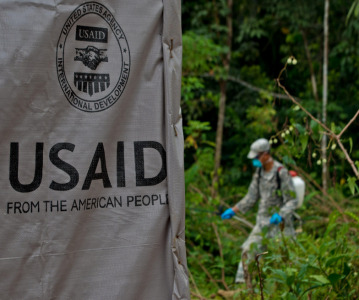A mRNA universal flu vaccine is in early stages of development
.png)
Researchers from the University of Pennsylvania have developed a universal flu vaccine using nanoparticle encapsulated mRNA.
A universal flu vaccine has long been considered the El Dorado of vaccines, and with the recent COVID-19 pandemic giving rise to the expedited development of numerous vaccines, this has never seemed more within reach.
Claudia Arevalo from the University of Pennsylvania, PA, USA, and colleagues have produced a mRNA lipid nanoparticle vaccine, which could be used as the basis for such a universal vaccine. The vaccine contains antigens from 20 subtypes of influenza A and B viruses, in other words, all known strains of the virus.
When tested in animals the vaccine triggered the production of cross-reactive and subtype-specific antibodies and protected against symptoms and death after infection. This result was seen after infection with strains of the virus with both matched and mismatched antigens.
Previous attempts at a universal vaccine have contained antigens for each particular subtype, but with Arevalo’s vaccine a smaller number of antigens are used, which are specific to multiple strains, therefore still protecting against all known forms of the viruses.
During the COVID-19 pandemic, Pfizer and BioNTech and Moderna made breakthroughs in using mRNA to develop effective vaccines against SARS-CoV-2. This step forward in technology, proven to be safe and effective, has led to increased research into the use of mRNA.
Arevalo’s team decided to build on this success and combine it with nanotechnology to develop 20 different mRNAs encapsulated in nanoparticles. Each particle encoded for a different hemagglutinin antigen, which helps the virus enter cells.
In mice, antibody levels remained stable for up to 4 months post vaccination. The results, published in Science, were more promising than shown by previous types of multivalent vaccines.
Questions regarding the probability of a vaccine that contains antibodies to virus strains that have not yet been seen in circulation in humans obtaining approval are valid, spurring further discussions surrounding how we approach protecting against viruses of pandemic potential in the future.
Related News
-
News US FDA adds haemodialysis bloodlines to devices shortage list
On March 14, 2025, the US FDA published an open letter to healthcare providers citing continuing supply disruptions of haemodialysis bloodlines, an essential component of dialysis machines. -
News Women in Pharma: Manufacturing personal and team success
Our monthly Women in Pharma series highlights the influential lives and works of impactful women working across the pharmaceutical industry, and how the industry can work towards making the healthcare industry and workplace more equitable and inclusive... -
News Pfizer may shift production back to US under Trump pharma tariffs
At the 45th TD Cowen annual healthcare conference in Boston, USA, Pfizer CEO Albert Bourla outlined the potential for Pfizer to shift its overseas drug manufacturing back to the US as pharmaceutical industry players weigh their options against Presiden... -
News Experimental drug for managing aortic valve stenosis shows promise
The new small molecule drug ataciguat is garnering attention for its potential to manage aortic valve stenosis, which may prevent the need for surgery and significantly improve patient experience. -
News Women in Pharma: Connecting accessible pharma packaging to patients – a Pharmapack Special
Throughout our Women in Pharma series, we aim to highlight how CPHI events encourage discussions around diversity, equity, and inclusion initiatives in the pharmaceutical industry. -
News Vertex Pharmaceuticals stock jumps as FDA approves non-opioid painkiller
UK-based Vertex Pharmaceuticals saw their stock shares soar as the US FDA signed off on the non-opioid painkiller Journavx, also known as suzetrigine, for patients with moderate to severe acute pain, caused by surgery, accidents, or injuries. -
News Trump administration halts global supply of HIV, malaria, tuberculosis drugs
In various memos circulated to the United States Agency for International Development (USAID), the Trump administration has demanded contractors and partners to immediately stop work in supplying lifesaving drugs for HIV, malaria, and tuberculosis to c... -
News 2024 Drug Approvals: a lexicon of notable drugs and clinical trials
50 drugs received FDA approval in 2024. The centre for biologics evaluation and research also identified six new Orphan drug approvals as under Biologics License Applications (BLAs). The following list picks out key approvals from the list, and highlig...
Position your company at the heart of the global Pharma industry with a CPHI Online membership
-
Your products and solutions visible to thousands of visitors within the largest Pharma marketplace
-
Generate high-quality, engaged leads for your business, all year round
-
Promote your business as the industry’s thought-leader by hosting your reports, brochures and videos within your profile
-
Your company’s profile boosted at all participating CPHI events
-
An easy-to-use platform with a detailed dashboard showing your leads and performance







